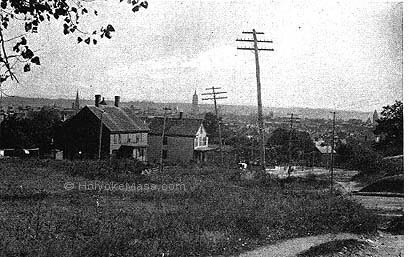
A View of the City from Money-Hole Hill.
|
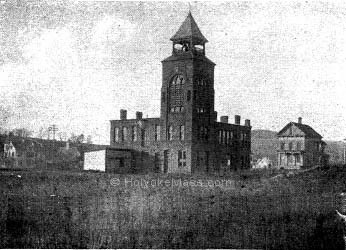
The Highland Engine House.
|
In the tenement districts I was pretty sure to have a mob of children following me, questioning, advising and disputing, and offering aid of various sorts. They felt it an honor if I would allow one of them to take hold of the end of my tripod. Then I was many times accosted with, "Want me to carry your box, Mister?" The boy was ready to do the carrying for a dime, or if I wouldn’t pay that, for five cents, and if I wouldn’t pay that, for nothing. If he made no financial gain, he had won a position of honor in the procession.
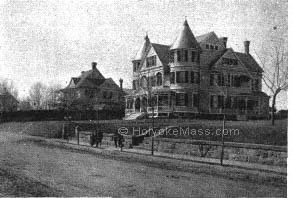
The Cleary House — Dwight Street.
|
Whenever I had informed a group that I had taken a picture, there were at once cries of, "Let me see it; let me have one," etc. I explained that it spoiled the picture to take it out, but this was not understood, and there were reproachful cried of, “Aw, you ought to let me see it,” and “He didn’t take no pitcher, he’s making fun of yer.” At times those who would want their pictures taken, agreed to pay me if I would only undertake the job. I had many offers of one cent, two cents and five cents, rarely more, and though it is said there is profit in doing a very large business, I did not see my way clear to accepting these offers. Many older people asked me to take their pictures, but almost invariably affirmed a timidity about it, saying they were afraid they would break the glass. I don’t suppose there is a photograph studio in our land where this remark about breaking the glass is not heard one or more times every day. It seems to be a standard joke, and I have heard it so many times in preparing “Picturesque Hampden,” that it has grown quite wearisome.
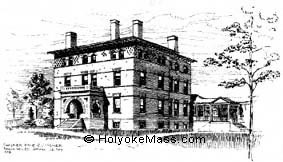
The City Hospital.
|
It so happened that I went into the lower districts of Holyoke on April Fool’s day. I had to use care not to respond hastily to the remarks fired at me, and proceded about my business in a considerable state of uncertainty. Attractive parcels on the sidealk, and even fat purses with no owners in sight, I passed with scarce a glance.
"Mister, you dropped your handkerchief," calls a voice. “Mister, your shoe’s all tored.” I feared there might be truth in the assertions, but I dared not betray the weakness to look and see.
At noon I happened to be opposite the Lyman mills, and waited a few moments to watch the help flock out. Lat of all came three girls, who noted my camera and egan to chatter at me. “Here, take our pirctures. Right this way. Here take mine. Ain’t I good lookin’ enough?” etc., etc. When they had passed I noticed that a big sheet of paper was pinned to the back of the middle one, whereon was this motto, "MUSICAL BOXES." It seemed very appropriate.
The best view of the lower city is to be obtained from Depot Hill, now being remodeled into a park. It is a high, sandy knowll, just east of the railroad station, crowned by a few tall pines and chestnuts and growths of bushed, and crossed by several well-worn footpaths. This, at least, is what it has been. But I suppose it will be a case where "the desert shall blossom like the rose" when the park idea is completely realized.
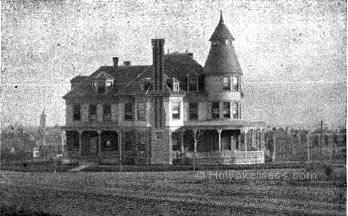
Residence of Casper Ranger.
|
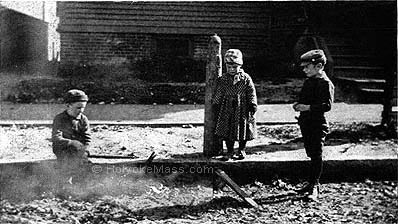
Pine Street — A Fire of Leaves.
|
© Laurel O’Donnell 1996 - 2006, all rights reserved
This document may be downloaded for personal non-commercial use only
and may not be reproduced or distributed without permission in any format.
This is an edited adaptation from the original publication.
|